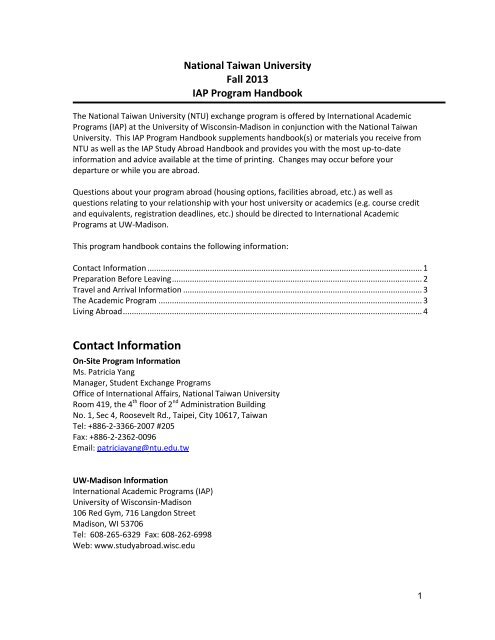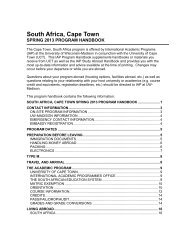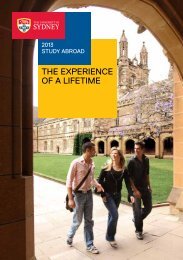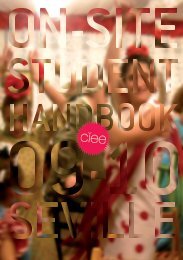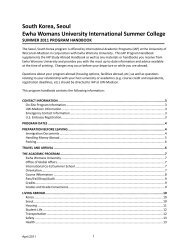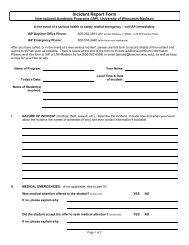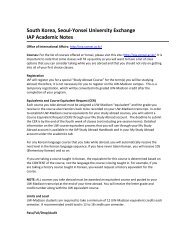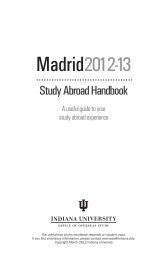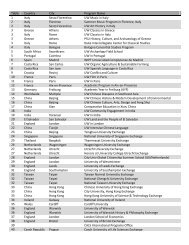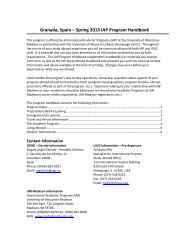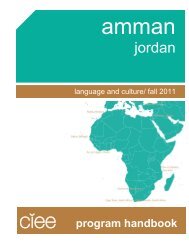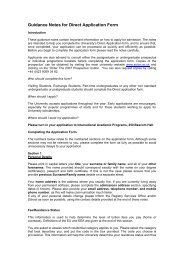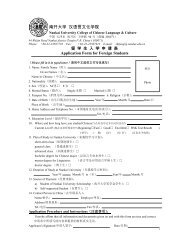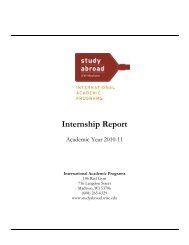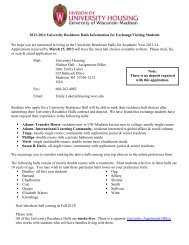NTU Taipei, Taiwan Program Handbook - UW Study Abroad ...
NTU Taipei, Taiwan Program Handbook - UW Study Abroad ...
NTU Taipei, Taiwan Program Handbook - UW Study Abroad ...
You also want an ePaper? Increase the reach of your titles
YUMPU automatically turns print PDFs into web optimized ePapers that Google loves.
National <strong>Taiwan</strong> University<br />
Fall 2013<br />
IAP <strong>Program</strong> <strong>Handbook</strong><br />
The National <strong>Taiwan</strong> University (<strong>NTU</strong>) exchange program is offered by International Academic<br />
<strong>Program</strong>s (IAP) at the University of Wisconsin-Madison in conjunction with the National <strong>Taiwan</strong><br />
University. This IAP <strong>Program</strong> <strong>Handbook</strong> supplements handbook(s) or materials you receive from<br />
<strong>NTU</strong> as well as the IAP <strong>Study</strong> <strong>Abroad</strong> <strong>Handbook</strong> and provides you with the most up-to-date<br />
information and advice available at the time of printing. Changes may occur before your<br />
departure or while you are abroad.<br />
Questions about your program abroad (housing options, facilities abroad, etc.) as well as<br />
questions relating to your relationship with your host university or academics (e.g. course credit<br />
and equivalents, registration deadlines, etc.) should be directed to International Academic<br />
<strong>Program</strong>s at <strong>UW</strong>-Madison.<br />
This program handbook contains the following information:<br />
Contact Information ........................................................................................................................... 1<br />
Preparation Before Leaving ................................................................................................................ 2<br />
Travel and Arrival Information ........................................................................................................... 3<br />
The Academic <strong>Program</strong> ...................................................................................................................... 3<br />
Living <strong>Abroad</strong> ...................................................................................................................................... 4<br />
Contact Information<br />
On-Site <strong>Program</strong> Information<br />
Ms. Patricia Yang<br />
Manager, Student Exchange <strong>Program</strong>s<br />
Office of International Affairs, National <strong>Taiwan</strong> University<br />
Room 419, the 4 th floor of 2 nd Administration Building<br />
No. 1, Sec 4, Roosevelt Rd., <strong>Taipei</strong>, City 10617, <strong>Taiwan</strong><br />
Tel: +886-2-3366-2007 #205<br />
Fax: +886-2-2362-0096<br />
Email: patriciayang@ntu.edu.tw<br />
<strong>UW</strong>-Madison Information<br />
International Academic <strong>Program</strong>s (IAP)<br />
University of Wisconsin-Madison<br />
106 Red Gym, 716 Langdon Street<br />
Madison, WI 53706<br />
Tel: 608-265-6329 Fax: 608-262-6998<br />
Web: www.studyabroad.wisc.edu<br />
1
For <strong>Program</strong> Advising & Grades:<br />
Erin Polnaszek<br />
IAP <strong>Study</strong> <strong>Abroad</strong> Advisor<br />
Tel: 608-265-6329<br />
E-mail: eepolnaszek@studyabroad.wisc.edu<br />
Emergency Contact Information<br />
In case of an emergency, call the main IAP number (608) 265-6329 between 8:00 a.m.-4:30 p.m.<br />
Monday-Friday; after-hours or on weekends call the IAP staff on call at (608) 516-9440.<br />
Embassy Registration<br />
All program participants who are U.S. citizens must register at the U.S. Embassy before<br />
departure as this will help in case of a lost passport or other mishap. You can register on-line at<br />
. If you are not a U.S. citizen, register at your home<br />
country’s embassy or consulate.<br />
U.S. Embassy in <strong>Taipei</strong>, <strong>Taiwan</strong> (The American Institute in <strong>Taiwan</strong>)<br />
No. 7, Lane 134, Section 3, Hsin Yi Road<br />
Da-an District<br />
<strong>Taipei</strong>, <strong>Taiwan</strong> 10659<br />
Tel: +886-2-2162-2000<br />
Fax: +886-2-2162-2239<br />
Web: http://www.ait.org.tw<br />
Email: amcit-ait-t@state.gov<br />
Preparation Before Leaving<br />
Refer to the Pre-Departure Checklist on pages four and five of the IAP <strong>Study</strong> <strong>Abroad</strong> <strong>Handbook</strong><br />
for essential information.<br />
Immigration Documents<br />
Passport<br />
A passport is needed to travel to <strong>Taiwan</strong> and to obtain your student visa. Apply immediately for<br />
a passport if you do not already have one. Passport information and application forms can be<br />
found on the U.S. State Department website (http://travel.state.gov/passport). If you already<br />
have your passport, make sure it will be valid for at least 6 months beyond the length of your<br />
stay abroad.<br />
Visa<br />
Students must apply for a valid visa before leaving for <strong>Taiwan</strong>. As there is no “student visa” for<br />
international students studying in <strong>Taiwan</strong>, students whose exchange period is more than 180<br />
days must apply for a Resident Visa. For students whose exchange period is less than 180 days,<br />
an extendable Visitor Visa is required. It is also recommended that students apply for a<br />
multiple-entry Visitor Visa instead of a single-entry visa if you plan to leave and come back to<br />
<strong>Taiwan</strong> during the duration of your program. For more information and for details on the<br />
application process, please go to:<br />
http://www.taiwanembassy.org/US/lp.asp?ctNode=2315&CtUnit=62&BaseDSD=7&mp=12.<br />
2
Money <strong>Abroad</strong><br />
The currency in <strong>Taiwan</strong> is the New <strong>Taiwan</strong> Dollar (TWD). To check the current exchange rate,<br />
visit: http://www.oanda.com/currency/converter/.<br />
Electronics<br />
<strong>Taiwan</strong> uses electric current of 110 volts at 60 cycles, many buildings have sockets with 220 volts<br />
especially for the use of air conditioners.<br />
Travel and Arrival Information<br />
The group airport pick-up service is provided upon request to all exchange/visiting students free<br />
of charge; however, it is restricted to several time slots. Students who request this service must<br />
complete the Group Airport Pick-up Service Request Form online. You are advised to indicate<br />
the time of your arrival that falls on the service slots. The request must be made at least 2 weeks<br />
(10 working days) prior to your arrival. Once the pick-up appointment has been arranged, you<br />
can log in the online system (link same as above) to know the name of the <strong>NTU</strong> student<br />
volunteers who will meet you at the airport and accompany you to <strong>NTU</strong>.<br />
For the safety of the student volunteers, it is not possible to provide airport pick-up for flights<br />
arriving in <strong>Taiwan</strong> before 8:00 am and after 9:00 pm. Therefore, if you plan to arrive earlier or<br />
later, you will need to arrange your own airport transportation and accommodation. One option<br />
for those who arrive in the early morning before 8:00 am is to wait in the airport for the group<br />
airport pick-up service until 9:00 am.<br />
The Academic <strong>Program</strong><br />
General Information<br />
Located in downtown <strong>Taipei</strong>, National <strong>Taiwan</strong> University (<strong>NTU</strong>) was the first university in<br />
<strong>Taiwan</strong>. Its history can be traced back to the early 20th century, with the founding of Taihoku<br />
(<strong>Taipei</strong>) Imperial University by the Japanese in 1928. After World War II and <strong>Taiwan</strong>’s<br />
retrocession to Chinese Sovereignty, the ROC (<strong>Taiwan</strong>) government resumed the administration<br />
of Taihoku University and renamed it as “National <strong>Taiwan</strong> University” in 1945. Meanwhile, the<br />
University consisted of six colleges and 22 departments. To date, the university continues to<br />
prosper and throughout the years has educated millions of professionals. In 2007, the University<br />
has a total of 11 colleges, 54 departments, 99 graduate institutes, and 30 research centers, and<br />
the number of students reached a total of 32,791.<br />
National <strong>Taiwan</strong> University - http://www.ntu.edu.tw/engv4/<br />
Office of International Affairs - http://www.ciae.ntu.edu.tw/english.asp<br />
Course Information<br />
Regular Courses<br />
In general, lectures and examinations are conducted in Chinese. Exchange students who do not<br />
have sufficient knowledge of Chinese should consult the professors or instructors before they<br />
enroll in these courses. More <strong>NTU</strong> course information can be found online at:<br />
3
https://nol.ntu.edu.tw/nol/coursesearch/index.php?lang=EN. (If it appears in Chinese, please<br />
select the English version from the drop-down menu on the right.)<br />
Courses Taught in English<br />
Although Chinese is the main language of instruction at <strong>NTU</strong>, there are also courses taught in<br />
English every semester; although not all colleges / departments offer these courses. A list of<br />
courses taught in English offered in the recent three semesters sorted by college is available in<br />
the <strong>NTU</strong> course information online system. Another way to access this system is through <strong>NTU</strong>’s<br />
English website at http://www.ntu.edu.tw/english/and click on “Courses.”<br />
Chinese Language Courses<br />
In addition to regular <strong>NTU</strong> courses, exchange students will be provided with free Chinese<br />
language courses sponsored by the Office of International Affairs (OIA). If you have selected to<br />
attend Chinese courses on your application form, you will be automatically enrolled and should<br />
follow the regulation of the Chinese Language Division (CLD) for the registration and placement<br />
test. In other words, students who do not sign up for the Chinese language courses while filling<br />
out the application form online will not be assigned to these courses.<br />
Registration<br />
The course enrollment process takes place online once the students have arrived on campus.<br />
Instructions on registering for classes will be in your student handbook from <strong>NTU</strong>.<br />
Course Equivalent Requests and My <strong>Study</strong> <strong>Abroad</strong><br />
Each course you take abroad must be assigned a <strong>UW</strong>-Madison “equivalent” course in order for<br />
your grades and credits to be recorded on your <strong>UW</strong>-Madison transcript. In order to establish<br />
<strong>UW</strong>-Madison course equivalents for your study abroad courses, you will submit a Course<br />
Equivalent Requests through your My <strong>Study</strong> <strong>Abroad</strong> account. Detailed information on the <strong>UW</strong><br />
course equivalent process that you will use through your My <strong>Study</strong> <strong>Abroad</strong> account is available<br />
in the IAP <strong>Study</strong> <strong>Abroad</strong> <strong>Handbook</strong>.<br />
Credits<br />
Conversions: One course is usually three credits with three classroom hours per week. Credits<br />
will be converted on a one-to-one basis. For example, a 3-credit course at NCCU will receive 3<br />
credits at <strong>UW</strong>-Madison. Some exceptions may apply pending on the department in which the<br />
class is instructed.<br />
Limits and Load: <strong>UW</strong>-Madison students are required to take a minimum of 12 <strong>UW</strong>-Madison<br />
equivalent credits each semester. A recommended credit load is 12 to 18 credits per semester.<br />
Pass/Fail/Drop/Audit<br />
Please refer to the IAP <strong>Study</strong> <strong>Abroad</strong> <strong>Handbook</strong> for academic policies.<br />
Grades and Grade Conversions<br />
Students will receive a letter grade on a scale from A to F. A grade of "A" is given for excellent<br />
performance; "B" for above average; "C" for average; "D" for minimally passing performance;<br />
and "F" for failure. Other grades include "W" (Withdrawal) and "P" (Pass). A student will receive<br />
a grade of "W" if he/she withdraws from the course. A student will receive a grade of "F" if<br />
he/she fails to attend classes without officially withdrawing from the course.<br />
4
Grades will be converted according to the following scale:<br />
<strong>NTU</strong><br />
<strong>UW</strong>-Madison<br />
84-100 A<br />
80-83 AB<br />
72-79 B<br />
68-71 BC<br />
60-67 C<br />
50-59 D<br />
0-49 F<br />
Living <strong>Abroad</strong><br />
<strong>Taiwan</strong> has a population of 23 million. The larger part of the island's inhabitants are the<br />
descendants of immigrants from the various provinces of mainland China, but in particular from<br />
the southeastern coastal provinces of Fujian and Guangdong.<br />
<strong>Taiwan</strong>'s total land area is only about 36,000 square kilometers (14,400 square miles); it is<br />
shaped like a leaf that is narrow at both ends. It lies off the southeastern coast of mainland Asia,<br />
across the <strong>Taiwan</strong> Strait from Mainland China-- a solitary island on the western edge of the<br />
Pacific Ocean. To the north lies Japan; to the south is the Philippines.<br />
<strong>Taiwan</strong> lies on the western edge of the Pacific "rim of fire," and continuous tectonic movements<br />
have created majestic peaks, rolling hills and plains, basins, coastlines, and other wonders.<br />
<strong>Taiwan</strong>'s tropical, sub-tropical, and temperate climates provide clear differentiation between<br />
the different seasons. The cultural aspects are also not to be missed. The blending of Hakka,<br />
<strong>Taiwan</strong>ese, indigenous people and mainland Chinese cultures has produced a rich plethora of<br />
cultural and social color. Whether it is religion, architecture, language, living habits, or food, it's<br />
just one big exciting melting pot! Food is the best representative of this cultural mixing and<br />
matching. Aside from cuisines from different parts of the mainland such as Zhejiang, Hunan,<br />
Guangdong, Yunnan, Shanghai, Beijing, Sichuan, and others, there is also the local <strong>Taiwan</strong>ese<br />
cuisine as well as the local delicacies of each area.<br />
Located in downtown <strong>Taipei</strong>, National <strong>Taiwan</strong> University (<strong>NTU</strong>) is the first university in <strong>Taiwan</strong>.<br />
Its history can be traced back to the early 20th century, with the founding of Taihoku (<strong>Taipei</strong>)<br />
Imperial University by the Japanese in 1928. After World War II and <strong>Taiwan</strong>’s retrocession to<br />
Chinese Sovereignty, the ROC (<strong>Taiwan</strong>) government resumed the administration of Taihoku<br />
University and renamed it as “National <strong>Taiwan</strong> University’’ in 1945. Meanwhile, the University<br />
consisted of six colleges (Liberal Arts, Law, Science, Medicine, Engineering, and Agriculture) and<br />
22 departments. To date, the University continues to prosper and throughout the years has<br />
educated millions of professionals. In 2008, the University has a total of 11 colleges, 54<br />
departments, 100 graduate institutes, and 33 research centers, and the number of students<br />
reached a total of 33,416.<br />
Housing<br />
5
Students can choose to live in two different housing options: Prince House or the International<br />
Youth Center (IYC). Prince House is a privately owned dormitory that is not affiliated with <strong>NTU</strong><br />
and is made of up of multiple buildings that are located close to <strong>NTU</strong>’s campus. Students will<br />
have access to wireless internet, a lobby and reception desk, work out facilities, a TV room and<br />
dining halls in Prince House. Meals are not provided. Single, double and triple rooms are<br />
available in Prince House; students will indicate their preference on the housing application.<br />
The International Youth Center (IYC) is the <strong>NTU</strong> owned dormitory on campus. In the IYC students<br />
will have access to laundry facilities, a kitchen/communal area, movie theatre, top floor balcony,<br />
and convenience stores. Meals are not provided. Students who choose this option will have a<br />
roommate and either a private bathroom or a shared bathroom with other students on their<br />
floor. Preference will be indicated on the housing application.<br />
Student Life<br />
Global Lounge – the Global Lounge provides a platform for cultural exchange wherein foreign<br />
students and local students can interact with one another freely. The lounge employs a number<br />
of student assistants who speak fluent English to provide advisory services on campus living and<br />
studying abroad. In addition, there is a television in the lounge that broadcasts news programs<br />
from around the world. http://global.ntu.edu.tw<br />
General Library – Situated at the end of <strong>NTU</strong>’s well-known Royal Palm Blvd., the General Library<br />
is the main library at <strong>NTU</strong>. With its rich book collection and its comfortable atmosphere, the<br />
library has become the place where many students like to stay between classes. On the fourth<br />
floor is the multimedia center that has a wide collection of classical films and audio tapes. You<br />
can also watch cable TV there. The library also has a 24-hour study room.<br />
Sports Center – the <strong>NTU</strong> Sports Center consists of a swimming pool, gymnasium, badminton<br />
courts, squash courts, table tennis, etc. Additional fees might apply in order to use certain<br />
facilities. http://www.pe.ntu.edu.tw/index.aspx<br />
Transportation<br />
<strong>Taipei</strong> Metro / Mass Rapid Transit (MRT)<br />
You can take the <strong>Taipei</strong> MRT at the GongGuan Station on Roosevelt Road. Single or one-way<br />
tickets are available at each station and the new <strong>NTU</strong> student ID card also functions as an Easy<br />
Card. You can add value to your Easy Card at every MRT station and major convenience stores in<br />
Great <strong>Taipei</strong> Area. http://www.trtc.com.tw/e/<br />
<strong>Taipei</strong> Bus<br />
Buses in downtown <strong>Taipei</strong> can take you to more places than MRT. However, there is no<br />
regulated system coordinating all buses, and it is recommended to get to the bus stop 10 to 15<br />
minutes earlier in case of traffic congestion and delays.<br />
http://www.taipeibus.taipei.gov.tw/index_e.htm<br />
Long Distance Bus<br />
To purchase long distance bus tickets, passengers can choose to buy directly from bus drivers<br />
(cash only and no changes will be given) or at the Main Bus Station, which neighbors <strong>Taipei</strong><br />
Railway Station. Below are two main bus companies.<br />
King Bus [ 國 光 客 運 GuoGuang]<br />
6
http://www.kingbus.com.tw/<br />
U-bus [ 統 聯 客 運 ]<br />
http://www.ubus.com.tw/onlineservice/lineserach.ASP<br />
<strong>Taiwan</strong> Railway<br />
There are seven railway lines available in <strong>Taiwan</strong>. Each line has its own characteristics and<br />
sightseeing routes. There are two lines that travel down the west coast and three lines<br />
transverse the north. The other railways go through the southern and eastern part of <strong>Taiwan</strong>.<br />
http://www.railway.gov.tw/en/index/index.aspx<br />
<strong>Taiwan</strong> High Speed Rail<br />
The High Speed Rail has been in operation since 2006 and it takes about 1.5 to 2 hours to travel<br />
from <strong>Taipei</strong> to Zuoying Station in Kaoshiung. http://www.thsrc.com.tw/en/?lc=en<br />
Safety<br />
Upon arriving at <strong>NTU</strong>, each student will receive an emergency contact card that lists the phone<br />
numbers of the Office of International Affairs staff. In case an emergency arises there is a<br />
contact protocol that is clearly explained on the card.<br />
Emergency Numbers<br />
Police 110<br />
Fire and Ambulance 119<br />
Other useful numbers<br />
<strong>NTU</strong> Hospital 8733-9240<br />
<strong>NTU</strong> Student Health Center Emergency 3366-9595<br />
24 Hours Student Safety Division 3366-9119<br />
24 Hours Campus Security 3366-9110<br />
<strong>NTU</strong> Emergency Contact<br />
Mr. Hong-Ming HU, Student Safety Division 3366-2054 jackjill@ntu.edu.tw<br />
Mr. Yih-Fang Chang, Student Assistance Division 3366-2048 vihfangc@ntu.edu.tw<br />
Health<br />
Students at <strong>NTU</strong> will have access to the Student Health Center:<br />
http://shmc.osa.ntu.edu.tw/main.php<br />
The Student Health Center on the main campus is staffed by doctors from the <strong>NTU</strong> Hospital and<br />
provides health services. It is located on the Royal Palm Boulevard across from the First Student<br />
Activity Center near the General Library. The Center provides various medical services including:<br />
Family Medicine, Ophthalmology, Dermatology, Ortolaryngology, Gynecology, Dentistry and<br />
Simple Surgery. Also, common blood tests, pap smear, dental scaling, abdominal sonography,<br />
physical therapy and plain x-ray studies are available. Students will need to check the clinic<br />
schedule online in advance and make appointments on the internet, by telephone or in person.<br />
7
No registration fee will be charged for those with <strong>NTU</strong> student IDs. Students with National<br />
Health Insurance cards (NHI cards) would be charged with partial extra self-payment of TWD 50.<br />
As for students with no NHI cards, they will have to pay a full payment of TWD 350. Fees for<br />
medicine and other special exams are not included in the general payments.<br />
General Number: 3366-2155<br />
Appointment Number: 3366-2175<br />
<strong>NTU</strong> Student Health Center Emergency: 3366-9595<br />
Communication<br />
When making calls, keep in mind time zone differences (www.timeanddate.com/worldclock).<br />
To make an international call to the United States, dial the access code for the country from<br />
which you are calling plus the United States country code (always “1”) followed by the<br />
appropriate U.S. area code and local number. To call internationally from the United States, dial<br />
“011”, the country code, city access code (if necessary) and the phone number . Country and<br />
city codes can be found online (www.timeanddate.com/worldclock/dialing.html). Some of<br />
above steps can vary if you are using a calling card.<br />
Public phones in <strong>Taiwan</strong> are divided primarily into two types, coin and card.<br />
Coin phones accept coins in denominations of NT$1, NT$5, and NT10. For local calls, NT$1 buys<br />
one minute of phone time. Phone cards are divided into magnetic strip stored value cards and IC<br />
stored value cards, and can be used all over <strong>Taiwan</strong>. Magnetic strip cards sell for NT$100 each,<br />
and IC cards are available in NT$200 and NT$300 versions. The cards are sold in railway stations,<br />
bus stations, scenic spots, and convenience stores.<br />
When making local calls it is not necessary to dial the area code; when making long-distance<br />
calls, however, the area code of the party being called must be dialed in first (see explanation on<br />
the public telephone) and then the number itself dialed. International calls can be made from<br />
private cell phones, public IDD phones, or hotel IDD phones. International calls are charged in<br />
units of six seconds.<br />
Skype: Skype is a free, downloadable software application that allows users to make live video<br />
and voice calls over the internet. Skype users can also add money to their account and can then<br />
use the service to call land lines and cell phones internationally at very low rates. Additionally,<br />
Skype also provides an instant messaging function as well as file sharing.<br />
To create a Skype account, users must download the application from www.skype.com and<br />
create a user name and password. Once the application is installed onto their computer, they<br />
can search for friends either by first and last name or using their friends' Skype usernames. Once<br />
a friend is added to a users contact list, they will be able to see whether that person is available<br />
to chat. If two users both have web-enabled video cameras for their computers, they will be<br />
able to chat face to face. For users without a web cam, a microphone is all that’s required for<br />
calls to another computer.<br />
ADDITIONAL RELEVANT INFORMATION/WEBSITES OF INTEREST<br />
U.S. State Department Students <strong>Abroad</strong> site:<br />
8
http://www.studentsabroad.state.gov/<br />
<strong>UW</strong>-Madison International Academic <strong>Program</strong>s<br />
http://www.studyabroad.wisc.edu<br />
U.S. State Department:<br />
http://travel.state.gov<br />
U.S. State Department Students <strong>Abroad</strong> site:<br />
http://www.studentsabroad.state.gov/<br />
Center for Disease Control<br />
http://www.cdc.gov/travel/<br />
Current exchange rates<br />
http://www.oanda.com<br />
Lonely Planet<br />
http://www.lonelyplanet.com<br />
<strong>Taiwan</strong> Tourism<br />
http://eng.taiwan.net.tw/<br />
<strong>Study</strong> in <strong>Taiwan</strong><br />
http://www.studyintaiwan.org/index.php?id=ge<br />
9


